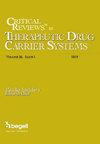Exploring Liposomes for Lung Cancer Therapy.
IF 2.5
4区 医学
Q2 PHARMACOLOGY & PHARMACY
Critical Reviews in Therapeutic Drug Carrier Systems
Pub Date : 2022-01-01
DOI:10.1615/critrevtherdrugcarriersyst.2021037912
引用次数: 1
Abstract
Cancer is referred to as a pleiotropic disease-causing approximately 9.6 million deaths in 2018. Among all cancers, lung cancer was the leading cause of death in 2017, and 12% of fatalities were alone due to lung cancer. The associated risk factors in lung cancer include smoking (80-85%), chronic inflammation in the lungs, COPD, pulmonary fibrosis, environmental and occupational exposure to nickel, arsenic, chromates, etc. Early diagnosed patients' treatment plan includes chemotherapy, immunotherapy, radiotherapy, surgery, and tumor ablation. Many sorts of drug delivery carriers have been used in the past, usually in targeted chemotherapy. Liposomes are spherical shape vesicles containing a lipid bilayer and aqueous core, with potency to encapsulate both hydrophobic and hydrophilic drugs with minimal toxicity. These vesicles have a particle size of 0.02-1000 μm allowing selective passive targeting to the tumor's deeper tissues. Current publications on liposomes highlight their acceptance and best choice among all systems to deliver synthetic and herbal drugs to the lungs. This review focuses on many aspects, which include an in-depth analysis of potential anticancer drugs that have utilized the advantages of liposomes for effective lung carcinomatherapy and devices used to deliver the active agents to the pulmonary tissues. Investigations on ongoing, approved, and failed clinical trials and patents on products related to lung cancer have been highlighted to provide a critical review on the subject.探讨脂质体在肺癌治疗中的应用。
癌症被称为一种多效性疾病,2018年导致约960万人死亡。在所有癌症中,肺癌是2017年死亡的主要原因,12%的死亡是由肺癌引起的。肺癌的相关危险因素包括吸烟(80-85%)、肺部慢性炎症、慢性阻塞性肺病、肺纤维化、环境和职业接触镍、砷、铬酸盐等。早期诊断患者的治疗方案包括化疗、免疫治疗、放疗、手术和肿瘤消融。在过去,通常在靶向化疗中使用了多种药物递送载体。脂质体是一种含有脂质双分子层和水核的球形囊泡,具有包封疏水和亲水药物的能力,毒性最小。这些囊泡的粒径为0.02-1000 μm,可以选择性地被动靶向肿瘤的深层组织。目前关于脂质体的出版物强调了它们在所有将合成药物和草药输送到肺部的系统中的可接受性和最佳选择。本文从多个方面进行综述,其中包括深入分析利用脂质体的优势进行有效肺癌治疗的潜在抗癌药物和用于将活性药物输送到肺组织的装置。对正在进行的、批准的和失败的肺癌相关产品临床试验和专利的调查已被强调,以提供对该主题的批判性审查。
本文章由计算机程序翻译,如有差异,请以英文原文为准。
求助全文
约1分钟内获得全文
求助全文
来源期刊
CiteScore
5.50
自引率
18.50%
发文量
27
审稿时长
>12 weeks
期刊介绍:
Therapeutic uses of a variety of drug carrier systems have significant impact on the treatment and potential cure of many chronic diseases, including cancer, diabetes mellitus, psoriasis, parkinsons, Alzheimer, rheumatoid arthritis, HIV infection, infectious diseases, asthma, and drug addiction. Scientific efforts in these areas are multidisciplinary, involving the physical, biological, medical, pharmaceutical, biological materials, and engineering fields.
Articles concerning this field appear in a wide variety of journals. With the vast increase in the number of articles and the tendency to fragment science, it becomes increasingly difficult to keep abreast of the literature and to sort out and evaluate the importance and reliability of the data, especially when proprietary considerations are involved. Abstracts and noncritical articles often do not provide a sufficiently reliable basis for proper assessment of a given field without the additional perusal of the original literature. This journal bridges this gap by publishing authoritative, objective, comprehensive multidisciplinary critical review papers with emphasis on formulation and delivery systems. Both invited and contributed articles are subject to peer review.

 求助内容:
求助内容: 应助结果提醒方式:
应助结果提醒方式:


